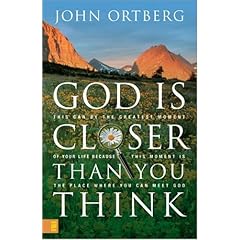God Is Closer Than You Think
by John Ortberg

If you've read any of John Ortberg's other books, you won't be dissapointed by God Is Closer Than You Think (Zondervan, 2005, Grand Rapids, MI). The author provides deep insight and thoughts about the ways of God using stories, humor and scripture. He draws analogies to common things of today in order to make the point of the subtitle: This Can Be The Greatest Moment Of Your Life Because This Moment Is The Place Where You Can Meet God. The ideas are presented in a logical order that pull you further and further into the book and into a better understanding of God.
In the first chapter, the author uses stories from the bible and a detailed discussion of Michelangelo Buonarroti's masterpiece painting of God and Adam on the ceiling of the Sistine Chapel, The Creation of Adam. He makes the point that God is moving heaven and earth, pursuing us. God is the originator of the relationship, not man. The point is further made repeatedly in the bible, from Adam, to Jacob, to Samuel, and the travelers on the road to Emmaus that God is seeking us, initiating the relationship; always present.
Chapter two: We need to train ourselves to find God. He's right there if we look for Him. God is always present whether we see him or not. The point is made clear and memorable by the author's comparison and illustrations to the Where's Waldo books once again interwoven with examples from scripture. The imagery and the detail of the analogy make the point memorable. "Where's Waldo? He's right there on the page. He's anywhere people are willing to see the whole world with eyes incapable of anything but wonder... [h]e's closer than you think."
In the subsequent chapters, he uses modern analogies like "DTR" or Define The Relationship", and movies "A Beautiful Mind" and "The Princess Bride" mixed with biblical exposition, Christian history, and practical application to help the reader practice taking advantage of our proximity to God. He is not to be hidden from as Adam did, but He is to be pursued, studied, known and followed moment by moment. He even took the DTR in chapter and changed it into a reminder that we should be following Jesus so closely, we should be covered in DTR, Dust of the Rabbi.
The book is entertaining and enlightening, compelling and convicting. Study it slowly, think about it deeply and ask God to change you as you learn more about Him.







